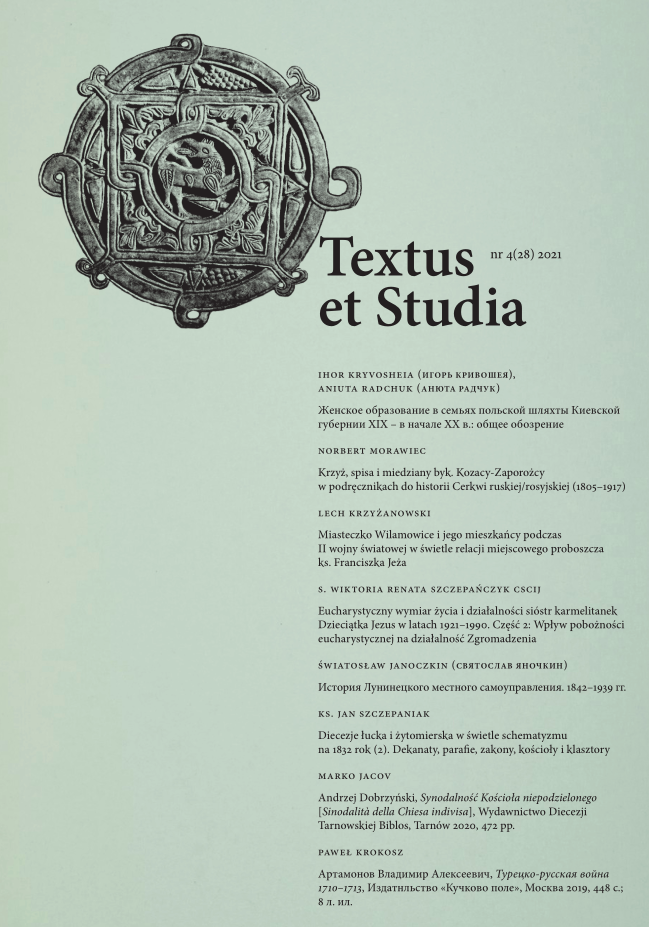Wilamowice i jego mieszkańcy podczas II wojny światowej w świetle relacji miejscowego proboszcza ks. Franciszka Jeża
DOI:
https://doi.org/10.15633/tes.07403Słowa kluczowe:
naród, parafia, proboszcz, volkslista, okupacja, NiemcyAbstrakt
The subject of the analysis was the written history of the local parish: Liber memorabilium Ecclesiae parochialis Willamowiciensis ab anno 1862, successively supplemented by successive parish priests from Wilamowice. Events of the Second World War were also described there. It was a special period in the history of the town and its inhabitants. Due to the fact that the inhabitants of Wilamowice did not use the Polish language on a daily basis, the invader considered these people to be Germans, suggesting that they should be placed on the Volkslist. It aroused reluctance on the part of Polish fellow residents and was tinder for more and more antagonism between the two groups. A witness of these events, the local parish priest, Fr. Franciszek Jeż described in detail the growing mutual animosities and the role of the German administration in escalating the conflict. The narrator did not try to convince himself of his neutrality. He clearly placed himself on the side of the Polish inhabitants, not hiding his indignation at the national attitudes of the Wilamowiceans. He accused them of betraying Polish interests turned into material benefits. In fact, the genesis of the problem was more complicated, nevertheless, many of his observations should be described as accurate and wellthought-out. The end of World War II did not eliminate the conflict. It entered a new phase of compensating for real and imagined wrongs by the Polish authorities. The totality of these complicated accounts was presented in an interesting way by Fr. Franciszek Jeż.
Bibliografia
Archiwum Parafialne. Parafia Wilamowice, wizytacje dziekańskie ks. Józefa Rączki od 1920 do 1948 b.p.
Fic M., Krzyżanowski L., Meus K., Wilamowice 1818–2018. Miasto i ludzie, Wilamowice 2018.
Filip E., Flamandowie z Wilamowic? [stan badań], „Bielsko-Bialskie Studia Muzealne” 2005, t. IV, s.146–198.
Jacewicz W., Woś J., Martyrologium polskiego duchowieństwa rzymskokatolickiego pod okupacja hitlerowską 1939–1945, t. III, Warszawa 1978.
Kubis B., Poznawcze i kształcące walory literatury dokumentu osobistego (na przykładzie relacji Polaków wysiedlonych z Kresów Wschodnich oraz Niemców wysiedlonych ze Śląska w latach 1944–1946), Opole 2007.
Kuhn W., Die Wilmesauer Frauentracht, „Schlesische Blätter für Volkkunde” 1940, Bd. 4, s. 109–149.
Kula M., Nośniki pamięci historycznej, Warszawa 2002.
„Wilamowice i Okolice” 1992, nr 21.
Pobrania
Opublikowane
Numer
Dział
Licencja
Prawa autorskie (c) 2022 Lech Krzyżanowski

Praca jest udostępniana na licencji Creative Commons Attribution-NonCommercial-NoDerivatives 3.0 Unported License.
Autorzy publikujący w czasopiśmie udzielają jego wydawcy zgody o następującej treści:
- Autor zachowuje autorskie prawa majątkowe do utworu, a jednocześnie udziela wydawcy czasopisma zgody na jego pierwszą publikację w wersji drukowanej i wersji online na licencji Creative Commons Uznanie autorstwa 4.0 Międzynarodowe oraz zgody na wykonywanie opracowań, w tym przekładów.
- Autor ma możliwość udzielania zgody niewyłącznej na opublikowanie utworu w wersji, która ukazała się w czasopiśmie (np. zamieszczenia go w repozytorium instytucjonalnym lub opublikowania w książce), wraz z informacją o jego pierwszej publikacji w czasopiśmie.
- Autor może umieścić swój utwór online (np. w repozytorium instytucjonalnym lub na swojej stronie internetowej) jeszcze przed zgłoszeniem utworu do czasopisma.

